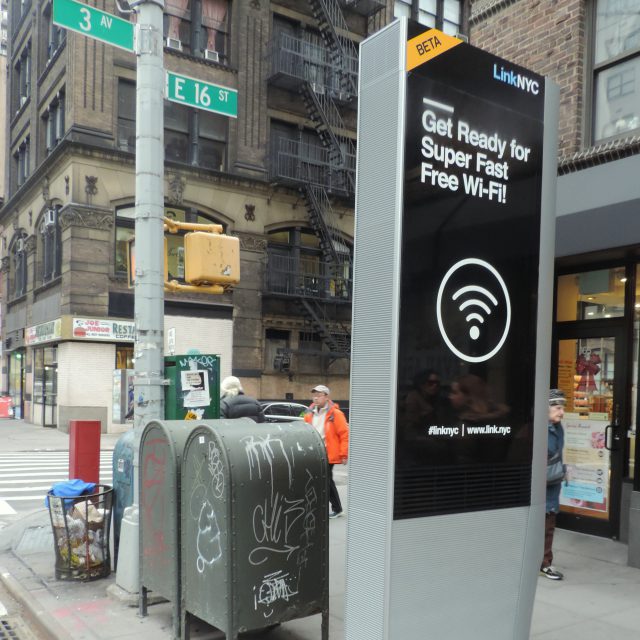As usual, the devil is in the details: namely, the privacy policy that governs the system and the fact that it’s bottom-lined by the most powerful advertising company on the planet, Google.
In the capitalist marketplace, enormous corporations typically do not spend millions of dollars to be nice. And sure enough, while the companies involved in the LinkNYC scheme are spending hundreds of millions of dollars on the project, they say they will make much more as the data from unsuspecting New Yorkers and visitors begins to pour in. They claim the information, which will include IP and MAC addresses, as well as web browsing histories and location data, will be anonymized. As project leader Dan Doctoroff said, “By having access to the browsing activity of people using the Wi-Fi — all anonymized and aggregated — we can actually then target ads to people in proximity and then obviously over time track them through lots of different things, like beacons and location services, as well as their browsing activity. So in effect what we’re doing is replicating the digital experience in physical space.” Saying words does not make them true; anyone who knows anything about modern data systems like these knows enormous data sets can be de-anonymized very easily. And there’s nothing remotely anonymous about your IP or MAC address.
Pinto describes how easy it is for experts to de-anonymize large data sets:
How many people share your digital signature, running a given app on a given type of phone with a given version of an operating system? How many of those people’s phones are always pinging out the name of your home Wi-Fi network? How many of those people’s phones commute to your office every day? “In study after study after study, aggregation techniques that we thought were really robust turn out to be really weak,” says Paul Ohm, a Georgetown Law professor who focuses on internet privacy. “This has been happening for seven years, and there’s a dozen of these studies every year. It’s a really risky business to promise anonymization and aggregation at this moment in time.”
What’s more, LinkNYC’s privacy statement isn’t worth as much as you might think. “This privacy statement is like most privacy statements,” says Eben Moglen, a professor at Columbia Law School who works on internet privacy. “Its job is to make you believe that something is being promised, when actually it lets them do anything they want.”
When the New York Civil Liberties Union (NYCLU) asked the city how information collected from the kiosks would be shared with law enforcement, they got no response. A source in the mayor’s office told Pinto they would never get one.
Minority Report style advertising is all around us now, but it’s often difficult to understand how it threatens our privacy and liberty. Companies that make billions of dollars off of our sensitive information don’t advertise the fact that they can easily control people by serving them particular advertisements, but they can. That might not be so offensive to you if those companies are collecting your information and using it to serve you advertisements for shoes. But the data can just as easily be used to prevent you from getting an abortion, as a recent investigation into tricky advertising practices at a Boston firm revealed. It’s not hard to imagine how advertising companies could use the vast profiles of detailed personal information they possess about millions of people to swing elections. Information collected and processed to market shoes today could tomorrow be put to a much more nefarious use. And as Professor Moglen said, nothing in the LinkNYC privacy policy would stop this from happening.
In the digital 21st century, services aren’t free. If we don’t pay for things like municipal wifi with taxpayer dollars, we are likely going to pay by handing corporations huge quantities of sensitive information about taxpayers. If we do that, we need to be very clear headed about the fact that we are also giving those companies the power to control us in ways we are only beginning to understand.
In the meantime, you can protect yourself from some public/private surveillance partnerships by keeping your wifi and bluetooth turned off when you’re not using them. If you do choose to use a LinkNYC kiosk, be aware that you are opening yourself up to lots of corporate and potentially also NYPD tracking.
The post Is your municipal wifi really free? Or are you paying with your sensitive data? appeared first on Privacy SOS.
Source Article from http://feedproxy.google.com/~r/blacklistednews/hKxa/~3/VhJoXR6-trg/M.html
 RSS Feed
RSS Feed















 July 7th, 2016
July 7th, 2016  Awake Goy
Awake Goy 
 Posted in
Posted in  Tags:
Tags: 













